
Thanks to a study by the Bureau of Investigate Journalism, we have insight into how at least one of America's largest pharmaceutical companies is handling its responsibilities during the COVID-19 pandemic.
Here is the lead page of the BIJ's latest research on Pfizer's COVID-19 vaccine
According to the research, Pfizer, the purveyor of the PfizerBioNTech BNT162b2 mRNA vaccine has been accused of bullying Latin American nations in vaccine negotiations, demanding that some governments to put up sovereign assets as collateral against the cost of any future legal cases that may arise as a result of the use of Pfizer's mRNA vaccine and any adverse reactions that may occur. In the case of Argentina and another unnamed Latin American nation, details of Pfizer's demands have not been released because the governments signed confidentiality agreements with Pfizer as a condition of receiving the company's COVID-19 vaccine.
In the case of Brazil, however, government officials were more than willing to share their experiences with Pfizer with Brazilians and the rest of the world. Here is a letter that was posted on Brazil's Ministry of Health website on January 2, 2021:
Here is a translation of the letter using Google Translate with all bolds being mine:
"Federal Government / Ministry of Health informs that it did receive the letter from the CEO of Pfizer, as well as meeting several times with its representatives. However, despite all the media power promoted by the laboratory, the initial doses offered to Brazil would be another marketing, branding and growth achievement for the vaccine producer, as has been happening in other countries. For Brazil, on the other hand, it would cause frustration in all Brazilians, since we would have, with few doses, to choose, in a continental country with more than 212 million inhabitants, who would be the ones chosen to receive the vaccine.
However, not only the frustration that the company Pfizer would cause to the Brazilians, the leonine and abusive clauses that were established by the laboratory create a barrier of negotiation and purchase. As an example, we cite five excerpts from the pre-contract clauses, which have already been widely publicized by the press:
1) That Brazil renounces the sovereignty of its assets abroad in favor of Pfizer as payment guarantee, as well as constitutes a guarantee fund with amounts deposited in an account abroad;
2) The departure from Brazilian jurisdiction and laws with the institution of an arbitration agreement under the laws of New York, in the United States;
3) That the first and second batches of vaccines be 500 thousand doses and the third one million, totaling 2 million in the first quarter, with the possibility of delayed delivery (a number considered insufficient by Brazil);
4) if there is a delay in delivery, there is no penalty; and
5) That a term of responsibility for any possible side effects of the vaccine be signed, exempting Pfizer from any civil liability for serious side effects resulting from the use of the vaccine, indefinitely.
After the Federal Government acquired all the initial production of the Butantan vaccine (from Sinovac) – 46 million doses -, with an option to purchase an additional 54 million, having received 2 million doses from Astrazeneca / Oxford from India, with an option to import of more doses, in addition to the production of this vaccine by Fiocruz of 100.4 million doses in the first semester and another 110 million doses in the second semester, also considering the possibility of acquiring 42.5 million doses through the Covax Facility mechanism, Pfizer representatives try to deconstruct an immunization work that is already happening across the country. Creating embarrassing situations for the Brazilian Government, which will not accept market impositions – which will also not be accepted by Brazilians.
At no time did the Federal Government, through the Ministry of Health, close its doors to Pfizer. In all dealings, we expect a different positioning of the laboratory, which includes a viable and satisfactory delivery, taking into account the strategies of the National Plan for Operationalization of Vaccination against Covid-19, an action of market values and fair legal application that serves both parties .
In addition to Pfizer, with which the Brazilian Government continues to negotiate, other laboratories are already in an advanced stage of negotiations with Brazil, within the established principles and standards.
It is worth mentioning the fact that, in addition to the aspects already mentioned, it is the only vaccine that needs to be stored and transported between -70 ° C and -80 ° C, with an interval of three weeks between the first and second doses.
In addition, the laboratory does not provide the diluent for each dose – which would be borne by the buyer.
Although the laboratory created a solution for the conservation of doses during transport (a styrofoam box lined with non-impermeable cardboard, which was presented to us at the end of November, on that occasion with the conservation information for 15 days) and offered make the logistics from the arrival of the USA to the point designated by the Ministry of Health, together with CONASS and CONASEMS, Pfizer would not be responsible for the replacement of the dry ice refill – which must be replaced every five days (they informed that the conservation would be 30 days in the month of December). In the contacts of August, September and October, the alternative of the thermal box had not yet been presented to us.
In addition, Pfizer has not yet submitted the draft of its contract – as requested in previous opportunities and, in particular at the meeting held on the morning of January 19 – nor does it have a protocol forecast date for the authorization request for emergency use or even registration with the National Health Surveillance Agency (Anvisa)."
Note the first condition; Brazil would have to pledge its sovereign assets as a guarantee as a condition of receiving the BNT162 vaccine from Pfizer. According to the letter, only 2 million doses of the vaccine would be supplied in the first quarter of 2021 by Pfizer, a paltry amount for a nation with a population of 211 million people. According to the Bureau for Investigative Journalism, Pfizer made a similar demand of Argentina as quoted here:
"Argentina could compensate for the vaccine’s adverse effects, but not if Pfizer makes a mistake,” said the official, who has detailed knowledge of the negotiations. “For example, what would happen if Pfizer unintentionally interrupted the vaccine’s cold chain [of -70C transport and storage] … and a citizen wants to sue them? It would not be fair for Argentina to pay for a Pfizer error.”
The official said talks soon became tense and complicated: “Instead of giving in on some points, Pfizer demanded more and more.” In addition to the changes in the new law, it asked Argentina to take out international insurance to pay for potential future cases against the company (countries were also asked to do this during the H1N1 outbreak).
In late December, Pfizer made another unexpected request: that the government put up sovereign assets – which might include federal bank reserves, embassy buildings or military bases – as collateral.
“We offered to pay for millions of doses in advance, we accepted this international insurance, but the last request was unusual: Pfizer demanded that the sovereign assets of Argentina also be part of the legal support,” the official said. “It was an extreme demand that I had only heard when the foreign debt had to be negotiated, but both in that case and in this one, we rejected it immediately.”"
Pfizer did tell the Bureau this when questioned about its business model for dealing with low- and middle-income nations:
"Globally, we have also allocated doses to low- and lower-middle-income countries at a not-for-profit price, including an advance purchase agreement with Covax to provide up to 40 million doses in 2021. We are committed to supporting efforts aimed at providing developing countries with the same access to vaccines as the rest of the world.”
Pfizer did, however, decline to comment on ongoing private negotiations.
According to Launch and Scale Speedometer, COVID-19 vaccines are being predominantly purchased by the wealthy, advanced economies, leaving the world's poorer nations out in the cold:
This clearly shows that the world's poorer nations will either have to do without the COVID-19 vaccines or will be forced to make commitments including being a part of a clinical trial for the vaccine manufacturer (i.e. Peru, Israel) or pass laws that will allow even the most egregious examples of negligence or malice by the vaccine manufacturer.
Let's close with this. According to Pfizer's Fourth Quarter and Full Year Results for 2020, Pfizer expects revenue of $15 billion from the sale of its BNT162b2 vaccine during 2021 as shown here:
Keep in mind the following:
1.) Pfizer paid out $8.4 billion in cash dividends to its shareholders during 2020 with its executive team and directors benefitting significantly as shareholders:
2.) BioNTech received $445 million from the Government of Germany to assist in the development of a COVID-19 vaccine
3.) Pfizer received a pre-order for $1.95 billion worth of vaccines from the United States government before the vaccine had even entered phase 3 trials in July 2020 and again in December 2020 for a total of $3.9 billion as shown here:
….and here:
And Big Pharma wonders why it has such a bad reputation. One has to wonder what the company would do if it actually took possession of the sovereign assets that it has demanded of its potential Latin American customers?
You can publish this article on your website as long as you provide a link back to this page.

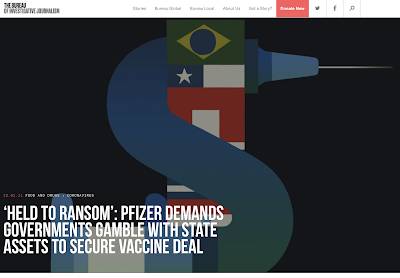
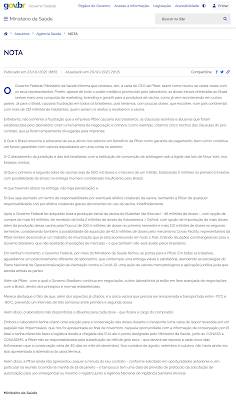
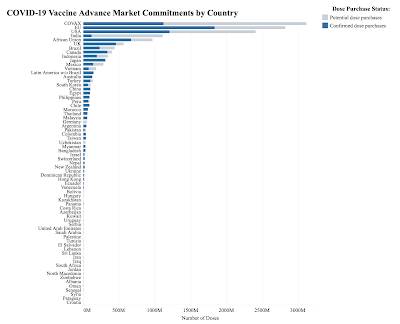
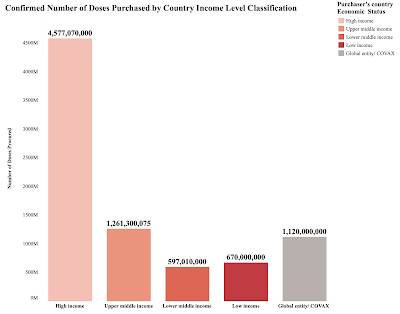
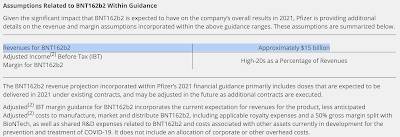
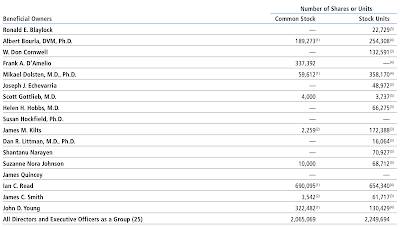


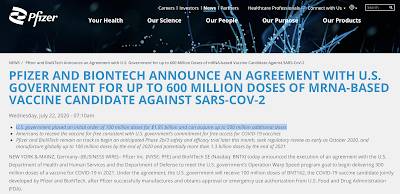
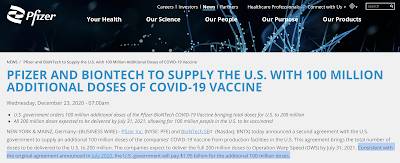
Be the first to comment